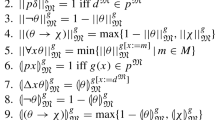Summary
In this paper we introduce a class of measures on formal languages. These measures are based on the number of different ways a string of a specified finite length can be completed to obtain strings of the language. The relation with automata and grammars is established, and the polynomial measure, a special case of the general notion, is studied in detail. We give some closure properties for well-known operations on languages, and finally, we prove that the class of polynomial measurable languages is a Pre-AFL.
Similar content being viewed by others
References
Brzozowski, J.: Derivatives of regular expressions, J. Assoc. Comput. Mach. 11, 481–494 (1964)
Ginsburg, S.: The mathematical theory of context free languages. New York: McGraw-Hill 1966
Hopcroft, J., Ullman, J.: Formal languages and their relation to automata. Reading (Mass.): Addison Wesley 1969
Salomaa, A.: On finite automata with a time-variant structure. Information and Control 13, 85–98 (1968)
Author information
Authors and Affiliations
Rights and permissions
About this article
Cite this article
Paredaens, J., Vyncke, R. A class of measures on formal languages. Acta Informatica 9, 73–86 (1977). https://doi.org/10.1007/BF00263766
Received:
Issue Date:
DOI: https://doi.org/10.1007/BF00263766




